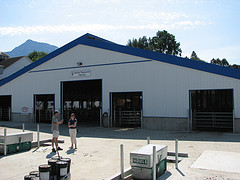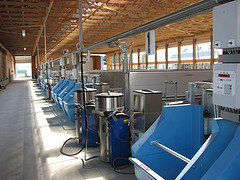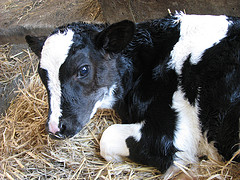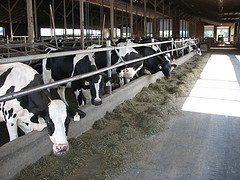 The UBC Dairy Education and Research Centre was established in 1997 when dairy research resources owned by UBC and Agriculture and Agri-Food Canada (AAFC) were consolidated on leased AAFC land in Agassiz BC. To guide the Dairy Centre in becoming a leading international centre for dairy research and technology transfer a "Six Step Development Strategy" was developed;
The UBC Dairy Education and Research Centre was established in 1997 when dairy research resources owned by UBC and Agriculture and Agri-Food Canada (AAFC) were consolidated on leased AAFC land in Agassiz BC. To guide the Dairy Centre in becoming a leading international centre for dairy research and technology transfer a "Six Step Development Strategy" was developed;
- Develop a dairy research herd of sufficient size to meet research needs (completed 2001).
- Construct research building housing the lactating herd, a milk parlor, limited student dry-lab space and administration offices (completed 2000).
- Replace old AAFC feed storage and calf and heifer buildings with modern well-equipped research buildings (completed 2006).
- Construct dry-lab and desk space, wet-labs, meeting/classroom area, sample preparation and cold storage areas (completed 2009).
- Increase on-site student housing (completed 2015).
- Recruit and retain outstanding faculty, staff and students (ongoing).
In 1999 UBC initiated a comprehensive rebuilding plan to replace the old AAFC animal buildings with larger buildings designed and equipped for modern dairy cattle research. A state-of-the-art research facility designed to house the lactating herd and to provide limited office and student dry-lab space was opened in 2000 (Development Strategy step 2). It houses more than 225 lactating animals which form part of a closed teaching research herd of approximately 500 animals. Construction and equipment was funded by UBC with assistance from AAFC.
In 2005 UBC's Department of Civil Engineering established a Manure Treatment and Nutrient Recovery Research Facility on site.
UBC officially opened three new experimental animal buildings in September 2006 completing Step 3 of the Development Strategy: Westgen Calf Research Facility for calves to 11 weeks of age, Heifer Research Facility for animals 11 weeks to 15 months and Feed Intake Research Facility for animals greater than 15 months of age. UBC, AAFC and Westgen provided funding with in-kind donations provided by DeLaval, Artex Fabricators Ltd., Arntjen North America and CanArm/BSM Agri Products. The animal teaching and research facilities enable researchers to continuously monitor feeding behaviour and individual intakes of grain, milk, water and forage and body weight for group-housed animals. The Westgen Facility contains 24 individual and six group pens as well as an HTST milk pasteurizer and a visitor lobby with a life-sized mural teaching aid illustrating the steps from photosynthesis to production of nutritious dairy foods developed with the BC Milk Producers Association and the BC Dairy Foundation. A new building containing student offices, laboratories and conference room for up to 60 people was completed in 2009.
The Dairy Centre’s Advisory Committee is comprised of representatives selected by various public sectors interested in the dairy industry. The Committee meets twice a year to provide advice on the general operation of the Centre, to plan ways of creating awareness of current and emerging issues facing the dairy industry, and to provide a channel for communication between the Centre’s researchers and the various sectors of the dairy industry.
Members:
- Chair, Ron Barker
- Animal Nutrition Association of Canada (ANAC), James Colquhoun
- BC Ministry of Agriculture and Lands, Tom Droppo
- BC Dairy Association, Dave Eto
- Agriculture Consulting and Advisors Walter Goerzen
- Dairy Industry Research and Education Committee (DIREC) David Janssens
- Pacific Agri-Food Research Centre (Agassiz), Sankaran KrishnaRaj
- BC Veterinary Medical Association, Dan McDermid
- Breeding/Genetics Industry, Kristin Dahl
- Mainland Milk Producers Association Theo Stoker
- UBC Faculty of Land and Food Systems, Jim Thompson (Secretary)
- BC Milk Producers Association, Thomas Wynker
Ex Officio Members:
- Nelson Dinn, Dairy Centre Manager, UBC
- All AAFC (Agassiz) and UBC Faculty of Land and Food Systems principal investigators with projects at the Centre
- John deJonge, Artex Fabricators Ltd.
The Dairy Centre is recognized as an international leading dairy education and research facility attracting visitors, students and scientists from around the world. Each year more than 2,000 visitors from academic institutes, government and industry visit the Centre to learn about its teaching and research activities. Nine principle investigators are responsible for dairy cattle research projects at the Centre:
- Ronaldo Cerri (UBC, Animal Reproduction)
- Anne Marie de Passille (UBC, Animal Welfare)
- Jeff Rushen (UBC Animal Welfare)
- Jim Thompson (UBC, Animal Metabolism)
- Doug Veira (UBC Ruminant Animal Nutrition/Management)
- Marina von Keyserlingk (UBC, Animal Welfare and Behaviour)
- Dan Weary (UBC, Animal Welfare & Behaviour)
The Centre’s manager, Nelson Dinn, is responsible for the day-to-day operations and staff. Victor Lo and Don Mavinic, principle investigators from UBC’s Department of Civil Engineering are responsible for the Manure Treatment and Nutrient Recovery Facility.
 The Dairy Centre and its scientists provide educational opportunities for Canadian and international scientists and students from universities, colleges, schools, and industries as well as for the general public. Since 1998 more than 200 individuals from over 35 different countries have received training at the Centre.
The Dairy Centre and its scientists provide educational opportunities for Canadian and international scientists and students from universities, colleges, schools, and industries as well as for the general public. Since 1998 more than 200 individuals from over 35 different countries have received training at the Centre.
Examples of educational activities supported by the Centre:
- Host visiting government, industry and university scientists
- Train postdoctoral fellows
- Train master’s and doctoral students
- Provide research facilities and training for the joint animal welfare program with the University of Edinburgh
- Provide research experience for undergraduate students each summer
- Provide animal production and farming experience for undergraduate students
- Host various international groups visiting local industries and organizations
- Host Greenbelt V eterinary Clinic cow health course for producers
- Assist with University of the Fraser Valley’s animal health and animal production classes
- Provide dairy cattle experience to Canadian and international veterinary medical students
- Host high school students gaining work experience
- Annually provide tours for more than 2,000 visitors arriving as individuals or in groups
- Publish about six issues of the Centre’s Research Reports per year
- Host dairy and other agriculture industry courses and meetings
Scientists at the Centre’s have published more than 100 original scientific articles in international journals, more than 150 articles in trade magazines and delivered more than 200 presentations to scientific and lay audiences in Canada and internationally since 1998.
 Research programs currently underway at the Dairy Centre include:
Research programs currently underway at the Dairy Centre include:
- Reducing early embryonic mortality and increasing long-term reproductive performance by dietary means (with Alberta Agriculture)
- Optimizing stall design to improve cow health and productivity
- Developing methods for early detection of lameness and lameness prevention
- Reducing the phosphorous content of liquid dairy “waste” (with UBC Civil Engineering)
- Investigating nutritional methods of reducing immuno-suppression in the transition dairy cow and young calf (with the University of Alberta)
- Improving housing and management of calves
- Using animal behaviour to indicate pre- clinical disease (with the University of Guelph)
- Developing endocrine technologies to eliminate the need for estrus detection and to reduce early embryonic mortality
- Studying the effect of colostrum management on calf immune status
- A field study of post-partum cyclicity and conception rates on Fraser Valley dairy farms
- Investigating fertility differences between heifers and cows by determining uterine environment and embryo quality
- Laboratory Equipment: Equipping the new research and teaching laboratories would complete Step 4 of the Dairy Centre’s Development Strategy. It would enable the Centre to provide a more comprehensive research program to the dairy industry and a more balanced education to its students. Fully equipped research facilities are essential for the Centre to continue attracting outstanding students and other scientists.
- Student Scholarships: A primary role of the Centre is to educate students, particularly graduate students. Scholarships and awards enabling students to work full-time on their studies and research are key to the Centre’s success in attracting and retaining outstanding Canadian and international scholars in dairy research.Individuals and organizations are encouraged to establish named endowed or annual scholarships.
- Endowed awards: The Dairy Centre welcomes donations to its two endowed awards; the James Shelford Memorial Scholarship and the John and Mary Young Memorial Scholarship.
- Annual Awards: In 2006 Viterra established two annual fellowships of $20,000 each and in 2010 Pacific Dairy Centre established a $2,000/year scholarship for students studying dairy cattle.
- Student Bursaries: Donations are sought to further develop the Centre’s Guy Fowler Endowment Fund designed to help students in short-term financial need.
- Postdoctoral Fellowships: Donations are sought to establish postdoctoral fellowships to help support outstanding doctoral graduates.
- Research Chairs: The education and research contributions of the Centre would be greatly increased through hiring additional outstanding scientists and teachers in fields of study related to the dairy industry. Matching funds are possible.
Development of the Dairy Centre depends upon support from all sectors. Many benefit from the Centre’s education and research activities as well as its investment in the local community. In addition to receiving education and research results, businesses and individuals benefit from investing in the Centre by receiving tax credits and by recognition through naming opportunities. Buildings, laboratories, equipment, scholarships, and research chairs may carry the name of a donor. Considerable national and international recognition is generated for donors by visitors to the Dairy Centre and by its numerous publications.
For information on how to help develop the UBC Dairy Centre contact:
- Ronaldo Cerri, [604] 822- 5056, ronaldo.cerri@ubc.ca
- Zoë Campbell [604] 827-5556, zoe.campbell@ubc.ca
- Nelson Dinn [604] 796-8410, nelson.dinn@ubc.ca





